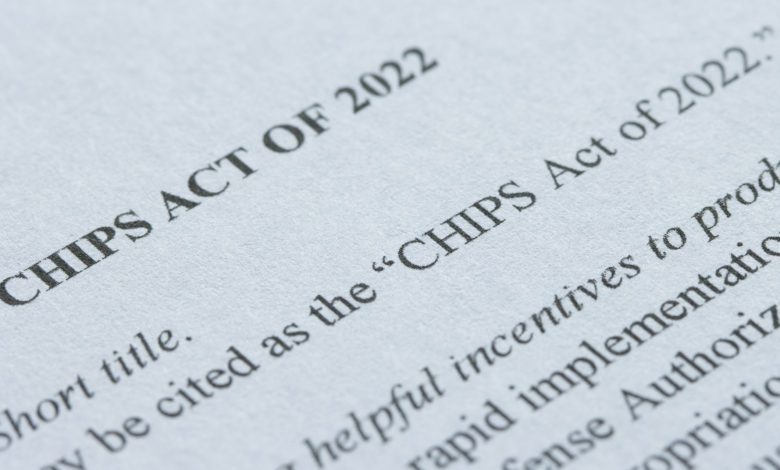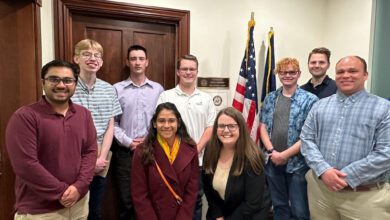
In Washington, there’s a coalition of powerful and effective policymakers who are often overlooked: Science and Technology Fellows.
Science & Technology Congressional Fellowships (S&T Fellows), including those sponsored by IEEE-USA and AAAS, bring strong-minded and successful engineers and scientists to the forefront of public policymaking on Capitol Hill. These fellowships are incredible opportunities for those who are used to solving problems through numbers to transition into a role that involves writing legislation, engaging with legislative branch decision-makers, and talking one-on-one with senior executive branch level public policy officials to resolve issues.
The CHIPS and Science Act, passed by Congress and signed into law this August by President Biden, is largely considered a huge win to the engineering community. The bill contributes $52.7 billion dollars toward semiconductor research, and $13.2 billion in research and development, among other historic investments.
What you might not know: you can thank S&T Fellows for some pieces of the CHIPS and Science Act.
The Foundation for Energy Security and Innovation (FESI) in the CHIPS and Science Act was partly driven by the research and legislative work done by Fellows of IEEE-USA, AAAS, and other affiliate organizations. FESI focused on advocating for an energy policy that strives for a strong, secure economy, even in turbulent times, which is an important goal given the turmoil in global markets that can occur at any time. FESI also supports commercialization of energy technology.
This is an extraordinary example of how Science and Technology Fellows can make a noticeable difference in public policy and, in this case, one of the landmark pieces of legislation passed in 2022.
Beginning with IEEE-USA 2016-2017 Congressional Fellow Yan Zheng, and concluding with IEEE-USA 2021-2022 Congressional Fellow Clarissa Bhargava — with five other S&T fellows continuing to shepherd the original bill in between — the years-long effort to pass FESI is also a great indicator of how much debate, time, collaboration, and work goes into turning a highly impactful legislative idea into law. It is likely that without the continuity of the contributions of the expertise of the S&T Fellows, the passage of FESI in 2022 may never have happened.
What is the Foundation for Energy Security and Innovation and why was the legislation monumental?
Many countries are pursuing energy strategies that ensure their economies have access to the energy they need to function without interruption. These strategies are being tested by Russia’s war with Ukraine. At the same time, there is a pressing need to address climate change through the development of reliable and affordable supplies of modern and clean energy. Disruptive innovative technologies in the energy sector hold the potential to provide solutions that could address the impact of both of these issues. However, unlike many other sectors, the energy sector faces several unique challenges to innovation, including high capital needs, lengthy development timelines, and a shifting regulatory environment. FESI addresses these challenges by fostering partnerships between government, industry, startups, and outside funding organizations.
How did the S&T Fellows make it all happen?
Non-profit foundations dedicated to supporting the mission of the U.S. government have been around for decades. The idea of such an organization first emerged in energy policy circles with the 2014 creation of the Foundation for Food and Agriculture Research, which works with the U.S. Department of Agriculture. In 2016, IEEE Congressional Fellow, Dr. Yan Zheng, working in Senator Coons’ office (D-DE), and DOE National Labs Fellow, Brian Crone, working in Representative Luján’s office (D-NM), met at an Information Technology and Innovation Foundation (ITIF) presentation highlighting its research and development policy recommendations to the incoming Trump administration. One of those ideas was for the creation of a DOE foundation to unlock new sources of funding and accelerate innovation at the DOE.
The Fellows, as the S&T experts working among legislative staffers, were able to produce a bipartisan bill that advanced via the usual legislative process. Most legislation that moves through Congress must go through what is called “Regular Order.” This means introduction, a hearing in the Committees of Jurisdiction, a legislative markup where members of the Committee can offer changes, and a final vote out of the Committee. This is all before the legislation would be able to be considered for passage by the House or Senate.
Part of this process is the necessary element of bipartisanship. Bills do not move without the help of colleagues on the other side of the political aisle. In years when bipartisanship is difficult to obtain, legislation stalls or moves slowly. This was part of the reason why FESI took several years to pass, and why the bill relied on the continuity of the S&T fellows who shepherded the bill from one Congress to the other. The S&T fellows tend to operate above the usual politics, and focus on the science and hard facts. They are, after all, scientists and engineers. They are able to hold discussions and debates with their peers, as well as be able to convey ideas to those without S&T backgrounds, to help all concerned understand the value and necessity of a good idea. Oftentimes, that can mean appealing to the constituent needs of a particular member of Congress. For example, South Carolina, the state which Senator Graham represents, is home to the Department of Energy’s Savannah River National Lab. As a member of the Appropriations Committee, Senator Graham had always been a strong advocate of the Lab and DOE-supported R&D. At one point during the bill’s evolution, Senator Graham co-led, giving the bill the much needed bipartisan support. Once bipartisanship was achieved in both congressional chambers, the FESI proposal was finally ready for bill introduction.
Big, new ideas can often be a hard sell. Finding support for FESI was not an easy task. But by building strong relationships and trust via shared coffees, after-hours networking, and many meetings to discuss the bill text, the S&T Fellows had created a strong bipartisan proposal that members of Congress were willing to support and introduce.
The first version of the bill was introduced in 2017, and was supported by a variety of groups, such as the Association of Public and Land-grant Universities, the Association of American Universities, Third Way, the Bipartisan Policy Center, Alliance to Save Energy, GridWise, the Information Technology and Innovation Foundation, and prominent voices in the energy innovation space, such as Jetta Wong, the former director of the Office of Technology Transitions at the Department of Energy. It was clear that this was a new, bold idea that should be taken seriously.
But since S&T Fellowships last only one year, the success of the proposal was dependent upon the continued expertise of the following year’s incoming S&T Fellows.
In 2018, the legislation received its first hearing, but as it did not pass that year, it required reintroduction in the new congress that began in 2019. Thankfully, with the expertise provided by the fellows, the bill was able to again receive bipartisan support. This cycle of collaboration, debate, and support continued until ultimately, FESI was passed as part of the large CHIPS legislation in 2022, at a time when Congress was considering many proposals that would bolster the U.S. economy, create clean energy and jobs.
Would FESI have happened without the S&T Fellows? Certainly not. The idea came from a Fellow and depended upon the continued support and dedicated work of moving it through several Congresses, until passage was possible. The story of FESI doesn’t end with passage of the bill. Because legislation like FESI only created and authorized innovative programs, now the focus turns to actually funding those programs. Current S&T Fellows will work on securing funding the necessary appropriations, while they continue to provide members of Congress and their staff with much needed S&T expertise.
If you are interested in being a Fellow for the 2024-2025 year, please visit the IEEE-USA website for more information so you can be prepared when applications open next year.






Important and interesting article, Kayla. Well done.